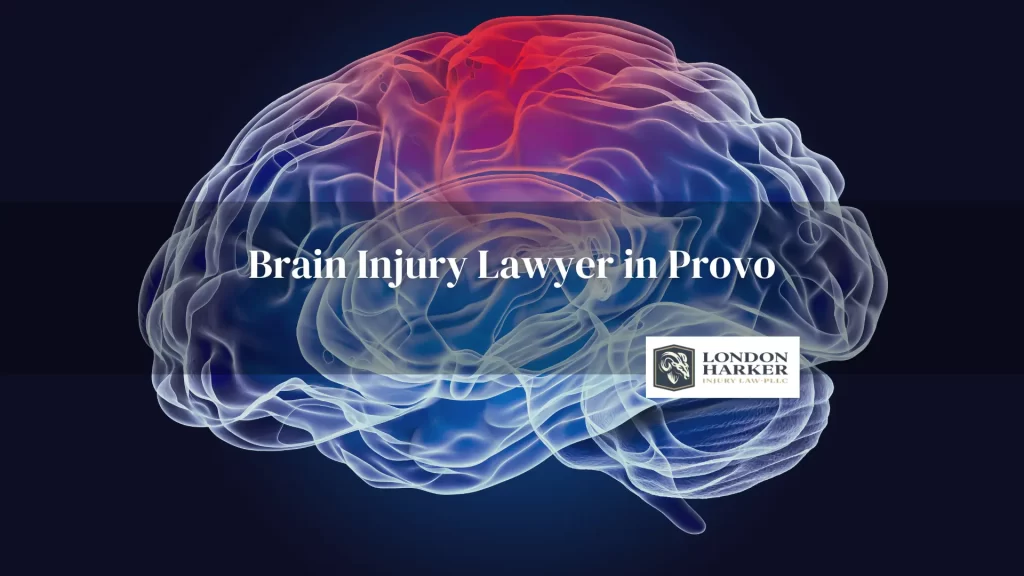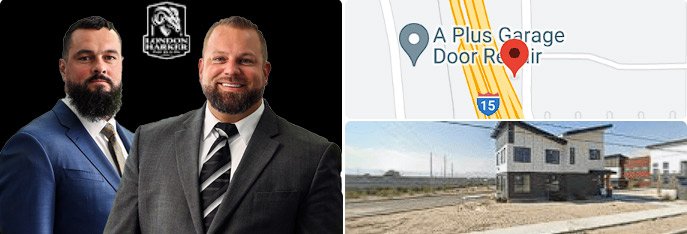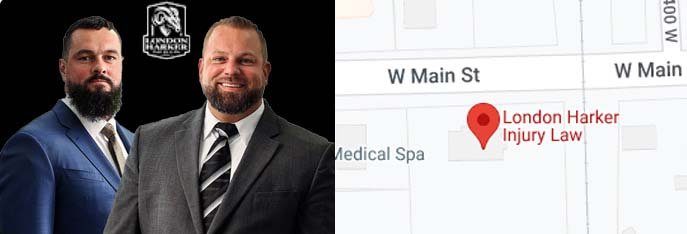Brain Injury Lawyer in Provo

After suffering a traumatic brain injury, your first thought is never to call a Provo brain injury lawyer immediately. That’s understandable. However, getting in touch with a brain injury lawyer as soon as possible after an accident can help improve your chances of recovering the money you need to cover your medical expenses and give you some much-needed financial stability during this uncertain and challenging time.
A brain injury can change your life. Traumatic brain injuries can cause physical impairments and even alter the way a person thinks or behaves. How do you put a price on your brain? Unfortunately, many victims of traumatic brain injuries are vulnerable to the aggressive tactics of insurance adjusters who want to settle a claim for as little money as possible as quickly as they can.
At London Harker Injury Law, we will take a stand for you. We are willing to fight for the money you deserve after you suffered a traumatic brain injury in an accident someone else caused. Our Provo personal injury lawyers have extensive legal knowledge and can manage the complex process of recovering compensation following an accident caused by a careless individual or entity.
Are you ready to learn more about your legal rights? Contact our Provo office online today or call us at 77CARCRASH and request a free legal consultation.
What Is a Traumatic Brain Injury?
A traumatic brain injury is any injury to the head or brain that damages the brain and impacts brain function. Unfortunately, brain injuries are not rare. Data from the Centers for Disease Control and Prevention indicates that traumatic brain injuries are one of the leading causes of death and disability in the United States.
Medical professionals typically classify traumatic brain injuries in one of two ways:
- Closed Brain Injury – A closed brain injury is typically caused by a significant blow or jolt to the head that jostles the brain, causing bleeding, swelling, or tissue damage. Closed brain injuries often occur when the head quickly accelerates and then decelerates abruptly, which can cause the brain to collide with the skull. Car accidents, sports injuries, and falls are common causes of closed-brain injuries.
- Penetrating Brain Injury – Penetrating brain injuries occur when foreign material penetrates the skull and enters the brain. Gunshot wounds cause many penetrating brain injuries. However, skull fractures and other violent events can also lead to penetrating brain injuries.
In addition to these designations, medical professionals may also categorize a traumatic brain injury by its severity. TBIs can be mild, moderate, or severe.
Common Causes of Traumatic Brain Injuries
The Centers for Disease Control and Prevention estimates that in the U.S., almost 190 TBI-related deaths occur every day. By far, one of the most common causes of traumatic brain injury is falls. Falls account for nearly half of TBI-related hospitalizations in the nation. Other common causes of traumatic brain injuries include:
- Car accidents
- Sports injuries
- Truck accidents
- Motorcycle accident
- Bicycle accidents
- Workplace accidents
Violent altercations like shootings, domestic violence and abuse, and assaults are also leading causes of traumatic brain injuries in the U.S.
Symptoms of Traumatic Brain Injuries
Most people assume that the signs of a traumatic brain injury will be evident after an accident. However, that isn’t always the case. The symptoms of TBI can vary and may appear mild at first, getting worse over time. After an accident, it is vital to seek medical attention immediately. Time is critical when it comes to diagnosing and addressing traumatic brain injuries. Some of the most common signs and symptoms of brain injury can include:
- Loss of consciousness
- Headache
- Pain
- Nausea or vomiting
- Fatigue
- Dizziness
- Confusion
- Slurred speech
- Seizures
- Sensitivity to light or sound
- Loss of coordination or mobility
- Changes in a person’s hearing or vision
- Changes in sleeping or eating behaviors
- Changes in mood
- Memory problems
- Behavioral changes
- Depression
- Anxiety
- Loss of bladder or bowel control
Swelling and bleeding in the brain can cause life-altering injuries and medical complications. Seek medical attention immediately after any accident and consult an experienced brain injury attorney to learn more about your right to recover compensation for medical expenses and other financial losses.
Types of Traumatic Brain Injuries
Numerous types of traumatic brain injuries can occur following a devastating accident. Some of the most frequently diagnosed brain injuries include:
- Concussion – Concussions are one of the most common types of mild TBIs and tend to occur after a violent jolt or hit to the head. Rest is typically the best method of treating a concussion.
- Diffuse Axonal Injury – A diffuse axonal injury is a severe condition. This type of TBI occurs when the brain is shaken or rotated inside the skull. The violent movement causes damage to delicate nerve fibers in the brain and can result in long-term cognitive and physical impairments, the most severe of which include coma or a vegetative state.
- Coup-Contrecoup Brain Injury – A coup-contrecoup brain injury is another significant form of TBI. Technically, the injury is not one but two brain injuries. The first injury occurs during the initial violent event or impact. The area of the head or brain involved in the initial impact can be significantly damaged. The subsequent injury is on the opposite side from the first injury and typically occurs when the brain collides with the skull again, causing damage to the side opposite from the initial impact or blow.
- Hypoxic Brain Injury – The brain needs oxygen to survive and function. When the brain’s oxygen supply is cut off or diminished, cells in the brain die, which can result in a hypoxic brain injury. When starved of oxygen-rich blood, brain cells can die in as little as four minutes, leading to potentially devastating physical and cognitive impairments.
- Hemorrhage – A brain hemorrhage happens when a jolt, blow, or other form of damage causes blood vessels in the brain to rupture. The leaking blood can cause significant bleeding and swelling within the brain.
- Intracranial Hematomas – Intracranial hematomas occur when blood collects in specific areas of the head or brain. Three types of hematomas can cause damage to the brain: subdural, epidural, and intracerebral.
What Are the Long-Term Effects of a Provo Traumatic Brain Injury?
The brain is a complex and sensitive organ. Some types of brain injuries require only minimal intervention. Effective treatment may only require rest and over-the-counter pain medication. More significant types of TBIs can cause long-term damage that can take months or years of medical intervention to recover from. Sometimes, the long-term damage and life-altering damage caused by a TBI is permanent.
The long-term complications caused by TBIs can be categorized in numerous ways, such as physical complications, intellectual issues, and cognitive and behavioral changes. However, many people experience long-term changes in more than one of these categories, making it challenging for them and their loved ones to cope with the tremendous side effects of a brain injury.
Examples of the physical complications associated with a traumatic brain injury can include:
- Paralysis
- Muscle weakness
- Seizures
- Loss of hearing
- Loss of vision
- Loss of coordination or balance
- Chronic pain
TBIs can also impact a person’s ability to think and reason and can cause significant changes in cognition, such as:
- Learning difficulties
- Memory loss or amnesia
- Difficulties with beginning or completing tasks
- Problems with reasoning or judgment
- Problems concentrating
- Challenges with problem-solving abilities
- Challenges with multitasking or staying organized
- Difficulty understanding spoken words
- Difficulty understanding written words
- Inability to use or recall specific words
- Inability to organize thoughts or ideas
- Inability to pick up on social cues
- Trouble following conversations or understanding others
One of the most challenging complications, especially for family members, involves significant emotional and behavioral changes like:
- Depression
- Anxiety
- Irritability
- Anger
- Insomnia
- Mood swings
- Obsessive habits or behaviors
- Child-like behavior
- Difficulty with self-control
- Engaging in risky behaviors
- Lack of self-awareness
Studies also link traumatic brain injury and brain damage to an increased risk of developing certain diseases later in life. TBIs may increase an individual’s chances of developing Parkinson’s and Alzheimer’s disease. Research also suggests individuals diagnosed with a TBI may be more than 28 times more likely to be diagnosed with bipolar disorder or other mental health illnesses.
Compensation for a Provo Brain Injury 
It can feel impossible to put a price on your brain and everything it does for you. You must discuss your situation with a knowledgeable brain injury lawyer before you accept money from anyone for your injury.
Calculating the value of a brain injury claim can be challenging, and you need the help only an experienced Utah brain injury attorney can provide during this time. An attorney can review the cause of the accident and the severity of your brain injury to determine the accurate and fair value of your claim. In most cases, a brain injury victim can seek compensation for the following:
- Current and future medical expenses
- Lost wages
- Loss of future earning capacity
- Property damage
- Loss of consortium
- Loss of enjoyment of life
- Pain and suffering
You don’t have to seek compensation for your injury alone. Let an attorney advocate for you.
Contact a Provo Brain Injury Lawyer for Assistance Today
Did the careless actions of another cause your brain injury? Hold them accountable and seek help from a skilled Provo brain injury lawyer today. At London Harker Injury Law, our compassionate legal team is here to help you navigate the compensation claim process from start to finish.
Call our Provo office at 77CARCRASH to arrange a free legal consultation.



